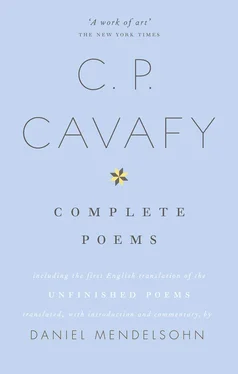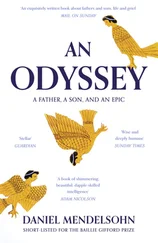The Bishop Pegasius
After the Swim
Birth of a Poem
Ptolemy the Benefactor (or Malefactor)
The Dynasty
From the Unpublished History
The Rescue of Julian
The Photograph
The Seven Holy Children
Among the Groves of the Promenades
The Patriarch
On Epiphany
Epitaph of a Samian
Remorse
The Emperor Conon
Hunc Deorum Templis
Crime
Of the Sixth or Seventh Century
Tigranocerta
Abandonment
Nothing About the Lacedaemonians
Zenobia
Company of Four
Agelaus
The Fragmentary Sketches
[Bondsman and Slave]
[Colors]
[My Soul Was on My Lips]
[Matthew First, First Luke]
Notes
Further Reading
Acknowledgments
Textual Permissions
A Note About the Translator
Also by Daniel Mendelsohn
Copyright
About the Publisher
INTRODUCTION
The Poet - Historian
“OUTSIDE HIS POETRY Cavafy does not exist.” Today, seventy-five years after the death of “the Alexandrian” (as he is known in Greece), the judgment passed in 1946 by his fellow poet George Seferis—which must have seemed rather harsh at the time, when the Constantine Cavafy who had existed in flesh and blood was still a living memory for many people—seems only to gain in validity. That flesh-and-blood existence was, after all, fairly unremarkable: a middling job as a government bureaucrat, a modest, even parsimonious life, no great fame or recognition until relatively late in life (and even then, hardly great), a private life of homosexual encounters kept so discreet that even today its content, as much as there was content, remains largely unknown to us. All this—the ordinariness, the obscurity (whether intentional or not)—stands in such marked contrast to the poetry, with its haunted memories of passionate encounters in the present and its astoundingly rich imagination of the Greek past, from Homer to Byzantium, from the great capital of Alexandria to barely Hellenized provincial cities in the Punjab, that it is hard not to agree with Seferis that the “real” life of the poet was, in fact, completely interior; and that outside that imagination and those memories, there was little of lasting interest.
As the man and everyone who knew him have passed into history, the contrast between the life and the art has made it easy to think of Cavafy in the abstract, as an artist whose work exists untethered to a specific moment in time. This trend has been given impetus by the two elements of his poetry for which he is most famous: his startlingly contemporary subject (one of his subjects, at any rate), and his appealingly straightforward style. Certainly there have always been many readers who appreciate the so-called historical poems, set in marginal Mediterranean locales and long-dead eras and tart with mondain irony and a certain weary Stoicism. (“Ithaca gave you the beautiful journey; / without her you wouldn’t have set upon the road. / But now she has nothing left to give you,” he writes in what is perhaps his most famous evocation of ancient Greek culture, which tells us that the journey is always more important than the inevitably disappointing destination.) But it is probably fair to say that Cavafy’s popular reputation currently rests almost entirely on the remarkably prescient way in which those other, “sensual” poems, as often as not set in the poet’s present, treat the ever-fascinating and pertinent themes of erotic longing, fulfillment, and loss; the way, too, in which memory preserves what desire so often cannot sustain. That the desire and longing were for other men only makes him seem the more contemporary, the more at home in our own times.
As for the style, it is by now a commonplace that Cavafy’s language, because it generally shuns conventional poetic devices—image, simile, metaphor, specialized diction—is tantamount to prose. One of the first to make this observation was Seferis himself, during the same 1946 lecture at Athens in which he passed judgment on Cavafy’s life. “Cavafy stands at the boundary where poetry strips herself in order to become prose,” he remarked, although not without admiration. “He is the most anti-poetic (or a-poetic) poet I know.” Bare of its own nuances, that appraisal, along with others like it, has inevitably filtered into the popular consciousness and been widely accepted—not least, because the idea of a plainspoken, contemporary Cavafy, impatient with the frills and fripperies characteristic of his Belle Epoque youth, dovetails nicely with what so many see as his principal subject, one that seems to be wholly contemporary, too.
No one more than Cavafy, who studied history not only avidly but with a scholar’s respect for detail and meticulous attention to nuance, would have recognized the dangers of abstracting people from their historical contexts; and nowhere is such abstraction more dangerous than in the case of Cavafy himself. To be sure, his work—the best of it, at any rate, which is as good as great poetry gets—is timeless in the way we like to think that great literature can be, alchemizing particulars of the poet’s life, times, and obsessions into something relevant to a wide public over years and even centuries. But the tendency to see him as one of us, as someone of our own moment, speaking to us in a voice that is transparently, recognizably our own about things whose meaning is self-evident, threatens to take a crucial specificity away from him—one that, if we restore it to him, makes him seem only greater, more a poet of the future (as he once described himself). His style, to begin with, is far less prosaic, far richer and more musical, and indeed is rooted far more deeply in the nineteenth century—which, astoundingly it sometimes seems, he inhabited for more than half his life—than is generally credited. (Some readers will be surprised to learn that many of Cavafy’s lyrics, until he was nearly forty, were cast as sonnets or other elaborate verse forms.) As for his subject, there is a crucial specificity there as well, one that tends to be neglected because it can strike readers as abstruse. Here I refer to those poems that are deliberately set in the obscurer margins, both geographical and temporal, of the Greek past: poems that, because they seem not to have much to do with our concerns today, are too often passed over in favor of the works with more obvious contemporary appeal.
The aim of the present translation and commentary is to restore the balance, to allow the reader to recapture some of that specificity of both content and, particularly, form. Any translation of a significant work of literature is, to some extent, as much a response to other translations of that work as to the work itself; the present volume is no exception. The most important and popular English translations of Cavafy in the twentieth century were those of John Mavrogordato (1951), Rae Dalven (1961), and Edmund Keeley and Philip Sherrard (1975); the latter in particular, with its briskly contemporary tone, its spare prosody, and its arresting use of Modern Greek spellings, was instrumental in persuading a new and younger audience that Cavafy’s “unmistakable tone of voice,” as Auden memorably put it, was one worth listening to. And yet precisely because (as Auden went on to observe) that tone of voice seems always to “survive translation,” I have focused my attention on other aspects of the poetry. In attempting to restore certain formal elements in particular, to convey the subtleties of language, diction, meter, and rhyme that enrich Cavafy’s ostensibly prosaic poetry, this translation seeks to give to the interested reader today, as much as possible, a Cavafy who looks, feels, and sounds in English the way he looks, feels, and sounds in Greek. A Greek, to deal with first things first, that is not at all a straightforward and unadorned everyday language, but which, as I explain below in greater detail, was a complex and subtle amalgam of contemporary and archaic forms, one that perfectly mirrored, and expressed, the blurring of the ancient and the modern that is the great hallmark of his subject matter. And a Greek, too, whose internal cadences and natural music the poet exploited thoroughly. There is no question that Cavafy in Greek is poetry, and beautiful poetry at that: deeply, hauntingly rhythmical, sensuously assonant when not actually rhyming. It seemed to me worthwhile to try to replicate these elements whenever it was possible to do so.
Читать дальше












